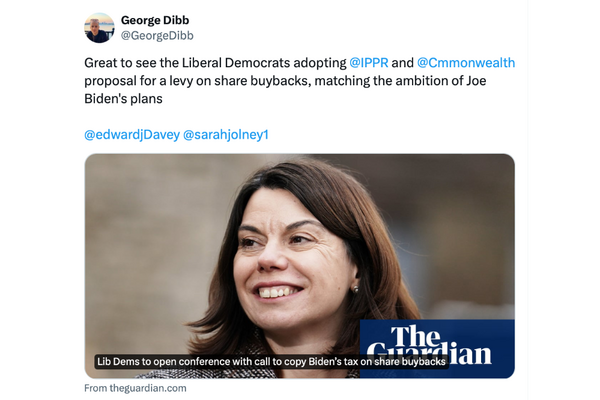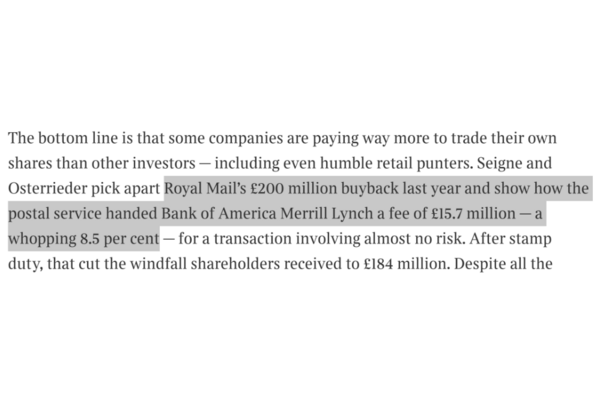Share Buyback Tax Scheme - why we are doing it and how it would work
Some of the biggest and most profitable companies in the world are listed on the London Stock Exchange and every year they spend tens of billions of pounds doing nothing more than buying back their own shares.
Rather than reward shareholders by paying a dividend, a company can achieve the same result through share buybacks. The stock price goes up; investors receive a premium; and remaining shareholders get a bigger stake in the company.
But share buybacks are controversial.
Every pound spent inflating share prices is a pound that could have been spent to grow our economy and tackle the climate emergency. And at a time when the UK is near the bottom of the table for business investment among major economies, that’s a problem.
Take BP for example. Last year, they raked in a massive, unexpected £11 billion, off the back of Putin’s illegal invasion of Ukraine. They spent less than £1 billion of that money investing in low carbon energy, and more than £5 billion buying back their own shares - five times more.
In the last two years, share buyback programmes from the 100 biggest firms on the Stock Exchange reached record highs, exceeding 50 billion pounds a year.
That’s why the Liberal Democrats are calling for a 4 per cent tax on share buybacks, which would incentivise proper business investment, spur economic growth and raise funds fairly for our public services. At current buyback levels, it would raise £2 billion a year.
Liberal Democrat Leader Ed Davey said:
“Neither the Conservative government or Labour Party have explained how they will fund public services fairly after the next election.
“The Liberal Democrats led the way in calling for a windfall tax on oil and gas giants making eye-watering profits from soaring prices. Now we are leading the way again, with a bold call for a new tax on share buybacks that could raise £2 billion a year to fund our public services.
Companies already pay huge fees to intermediaries when they do share buybacks which are often a lot higher than 4%. In 2022 Royal Mail paid double that with an 8.5% fee and still went ahead with its buyback.
That is over double what our new policy would levy, showing that companies are more than willing to push ahead with buybacks in order to boost their share price, despite the added cost.
Over the last two decades, there has never been a year where companies didn’t do share buybacks. Even in the depths of the financial crisis, listed firms spent billions of pounds buying back their own shares.
This bold new policy will incentivise productive investment and promote economic growth while raising additional revenue for our public services.
Ed Davey said:
“Large corporations from fossil fuel giants to banks are making huge profits off the back of families facing soaring energy bills, mortgage payments and food prices. It is only fair that we ask these companies to pay more in tax.
“This new levy would not just not just raise much-needed money for public services, it would encourage investment, help create jobs and boost growth including in the green industries of the future.”

